In 2025, data privacy remains one of the most critical issues for fintech companies, given the volume and sensitivity of the financial information they handle. As financial services continue to move online and become more integrated into everyday life, the responsibility to protect customer data has never been greater. Fintech companies are utilizing advanced technologies such as end-to-end encryption, tokenization, and multi-factor authentication (MFA) to enhance security and safeguard sensitive financial data. In addition, stringent compliance with data protection regulations like GDPR in Europe and CCPA in California has become a fundamental aspect of how fintech firms operate and ensure their customers’ privacy.
One of the most important methods fintech companies use to protect data privacy is through encryption. By encrypting sensitive information, fintech companies ensure that even if hackers gain access to data, it remains unreadable without the decryption key. End-to-end encryption (E2EE) has become the gold standard, ensuring that data remains encrypted throughout its journey, from the point of entry to its final destination. This method is crucial for preventing data breaches during transmission and protects customer information from malicious actors. With more transactions moving online and through mobile apps, encryption has become a non-negotiable tool in fintech companies’ security arsenals.
Another approach gaining prominence in the fintech industry is tokenization, which replaces sensitive information like credit card numbers with unique, randomly generated tokens. These tokens are useless outside the specific environment in which they were created, rendering them much less valuable to hackers. Tokenization minimizes the risk of data breaches because even if the tokenized data is intercepted, it has no real-world value. This technology is being widely adopted by payment processors, online banking apps, and even digital wallets, where securing users’ financial details is paramount. In 2025, tokenization is not just a best practice but an essential aspect of financial data protection.
As the sophistication of cyber threats continues to evolve, multi-factor authentication (MFA) has become a fundamental layer of security for fintech companies. MFA requires users to provide two or more verification factors to access their accounts, typically combining something they know (a password) with something they have (a mobile device or authentication app) or something they are (fingerprints or facial recognition). This extra step makes it much harder for unauthorized parties to gain access to sensitive financial data. Given the increasing frequency of data breaches, fintech companies have integrated MFA into their platforms, ensuring that even if a password is compromised, the account remains protected.
With stricter data protection laws being enforced globally, fintech companies are taking steps to ensure compliance with these regulations. For instance, the European Union’s General Data Protection Regulation (GDPR) and California’s Consumer Privacy Act (CCPA) impose stringent requirements on companies that handle personal data. Fintech companies are required to obtain explicit consent from users before collecting or processing their personal information, and they must provide users with the ability to access, correct, or delete their data. These regulations have prompted fintech companies to be more transparent with customers about how their data is used, while also ensuring they have the necessary systems in place to handle privacy requests.
Beyond compliance, fintech companies are increasingly adopting a “privacy by design” approach, embedding data protection measures into every aspect of their operations. This means that privacy considerations are integrated into the development of new products, services, and platforms from the outset. By implementing privacy-focused systems and protocols at the design stage, fintech companies can mitigate risks before they even arise. This proactive approach not only helps in meeting regulatory requirements but also builds customer trust, as consumers are more likely to use services that prioritize their privacy and security.
Artificial Intelligence (AI) and machine learning are also playing a significant role in enhancing data privacy in the fintech industry. AI-driven solutions are being used to detect unusual patterns of behavior that may indicate fraud or a security breach. Machine learning algorithms can analyze vast amounts of data in real-time, identifying anomalies faster than traditional methods and enabling fintech companies to respond to potential threats before they escalate. These technologies are helping to predict and prevent cyberattacks, ensuring that customer data remains secure in an increasingly complex digital landscape.
In conclusion, as we move further into 2025, fintech companies are taking data privacy seriously by adopting cutting-edge technologies and ensuring compliance with global regulations. Through encryption, tokenization, multi-factor authentication, and AI-driven security measures, these companies are building robust systems to protect customer data from evolving cyber threats. The focus on privacy by design ensures that data protection is at the heart of every fintech offering. As data privacy concerns continue to grow, fintech companies that prioritize transparency and security will earn their customers’ trust, ensuring long-term success in a competitive market.















 The Inc Media is one of the most renowned global Online Business Magazines, that carries news stories about entrepreneurship, small business management, and business. Being a global business magazine, we carve for influential stories and try to take them globally to uplift the business standards and educate the people about new innovations in the business world...
The Inc Media is one of the most renowned global Online Business Magazines, that carries news stories about entrepreneurship, small business management, and business. Being a global business magazine, we carve for influential stories and try to take them globally to uplift the business standards and educate the people about new innovations in the business world...